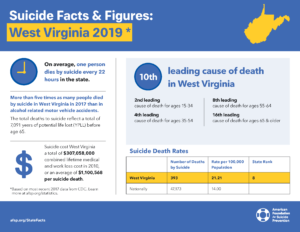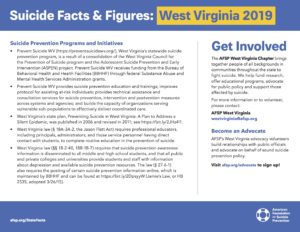MORGANTOWN, W.Va. — In a time and place of high anxiety, sometimes a caring voice on the other end of a phone is a lifesaver.

According to the World Health Organization, the United States has the 3rd highest level of anxiety and depression in the world.
The Substance Abuse and Mental Health Services Administration reports 4.2 percent of adults in West Virginia have serious thoughts of suicide each year.
West Virginia has the 8th highest suicide rate in the country. On average, someone here dies of suicide every 22 hours.


Those most at risk? It’s not who you think. There is a common misconception that teenagers are most at risk, but the most at-risk demographic is middle-aged and older people.
Risk factors for suicide include loneliness and isolation. During this pandemic, both of these are likely to increase, and that is of particular concern in a state with a population that skews older. Fortunately, evidence shows that something as simple as an intervention from a hotline worker can keep a depressed person safe until a higher level of treatment can be initiated.
First Choice Services, the group that answers the National Suicide Lifeline for West Virginia callers, says calls have remained steady throughout the pandemic, but they are preparing for an increase in calls.
Brittany Shawver, Program Director for the Lifeline in West Virginia, says they typically receive over 100 calls per week. She said in the last couple weeks many callers have referenced the COVID pandemic as a triggering event.
Shawver explained that there are two major factors involved.
First, people are more anxious than ever. They may be worried that they or a loved one will catch the virus or they may be panicked about income loss.
Second, routine and social supports have crumbled for many. Individuals may be no longer going to work or spending time with friends and family.
Shawver explained, “We’ve had calls from people working with the public, who are severely anxious because they are being asked to have close contact with people without protective equipment. We’ve talked to women in violent relationships who no longer feel they have an escape. We’re hearing from a lot of people who say they just don’t have anyone else to talk to about their stress, and that’s okay, we are here for them. You don’t have to be suicidal to call. Our call agents are there to listen to you, help you problem-solve, and if you need a higher level of assistance, they will find that for you.”
She urges anyone who is feeling emotionally frail, especially those who are isolated and having thoughts of suicide, to call the line. The number is 1-800-273-TALK (8255) and it is available 24/7.
References:
https://www.americashealthrankings.org/explore/annual/measure/Suicide/state/WV
https://www.samhsa.gov/data/sites/default/files/2015_West-Virginia_BHBarometer.pdf





